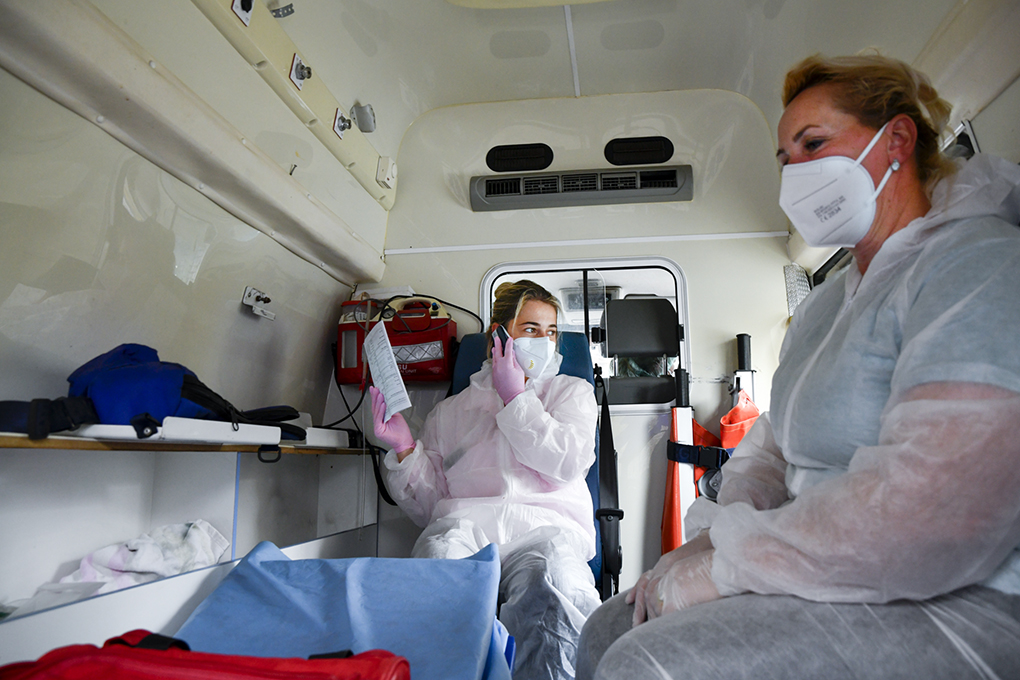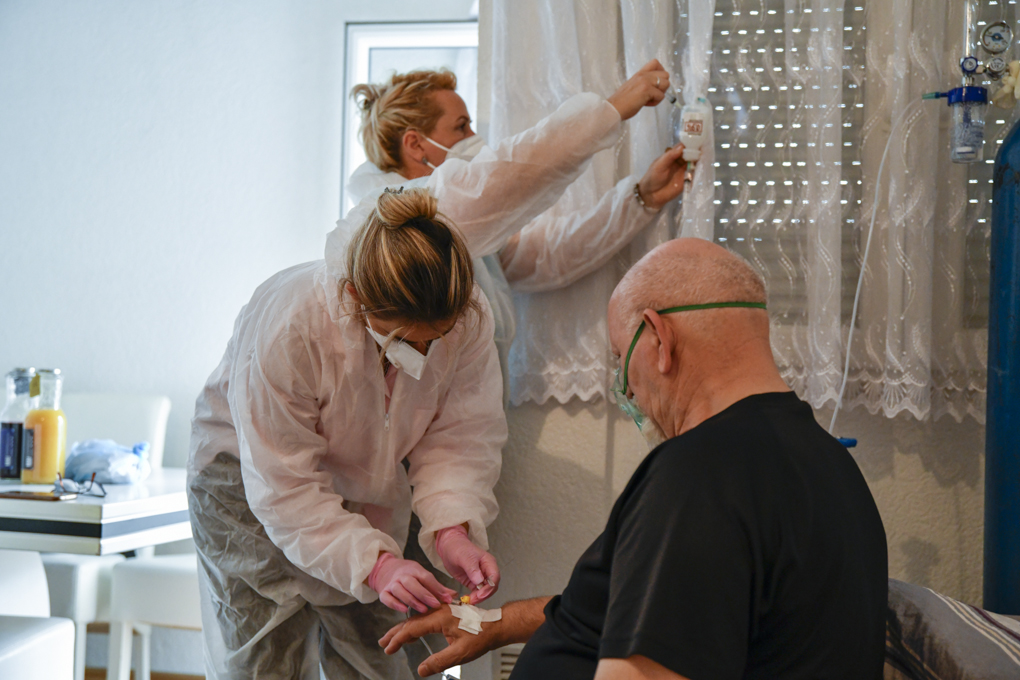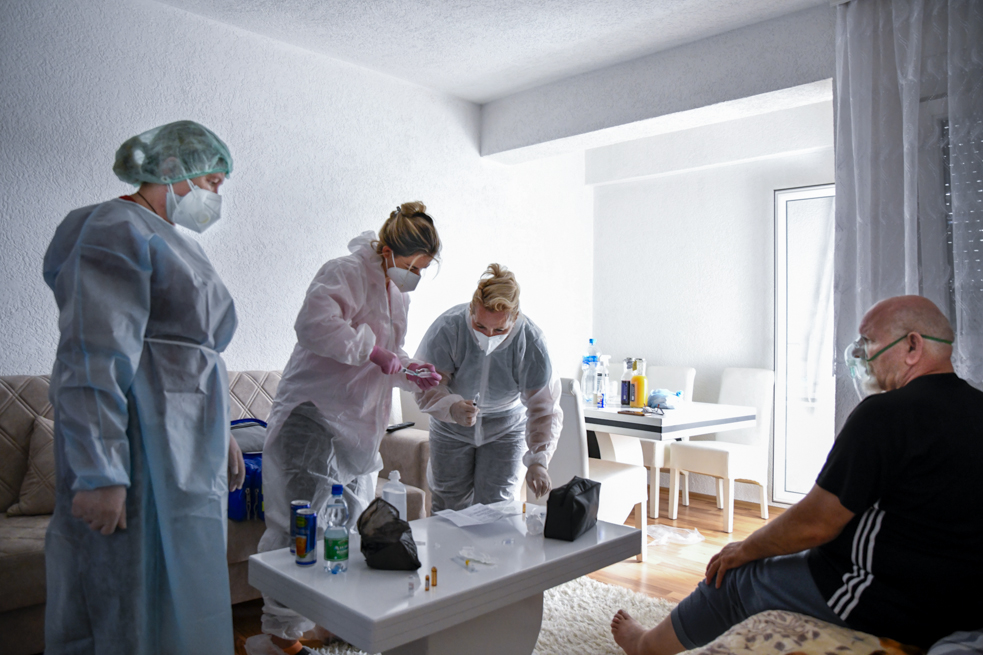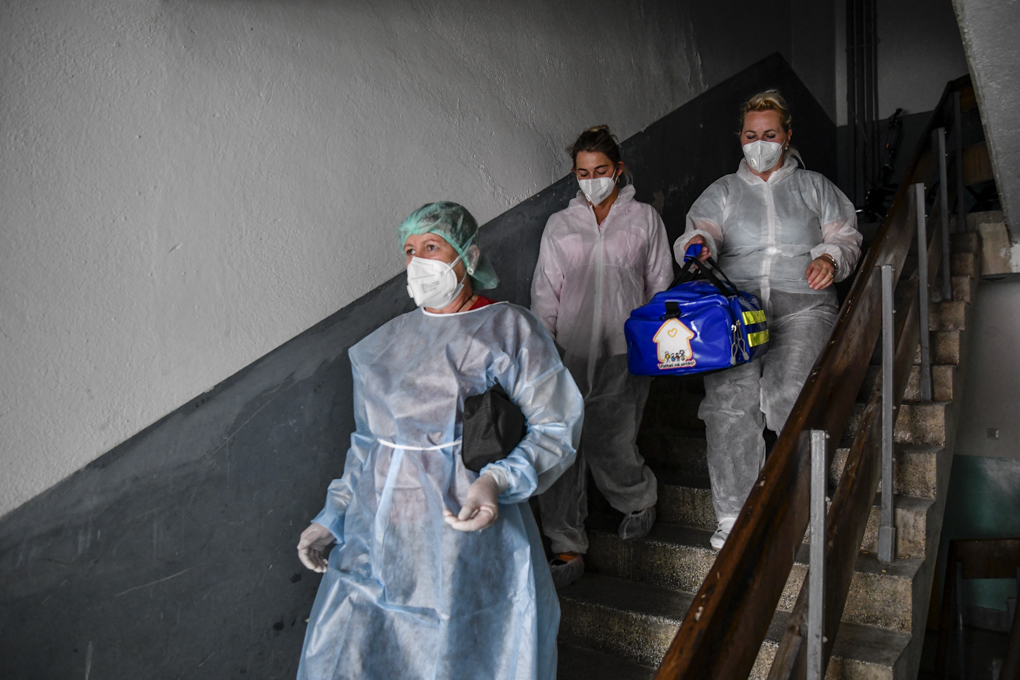It has been about a year and a half since Kosovars applauded from their balconies in solidarity with health workers who were facing a largely unknown COVID-19 virus. The applause started in the evening in most cities and neighborhoods, breaking the sense of isolation and sending a message of unity in the fight that had just started.
Since then, three governments have been replaced in the country and general elections have been held, often redirecting attention away from the pandemic waves that followed the imposition and immediate lifting of restrictive measures.
In particular, the first two months of this summer created the false impression that the fight against the pandemic had largely been won.
Warnings of the oncoming danger posed by the Delta variant were overshadowed by a mostly low number of infections and deaths, an almost complete easing of restrictive measures by the government and the beginning of mass vaccination. Crowds gathered in squares, nightclubs and wedding halls, the airport came back to life and houses were full of diaspora families, all the while spectators flooded into festivals and concerts, and celebrations for the Olympic gold medals in judo took place. On top of that, new local elections were being prepared.
It would not be long before the second half of August, when the rapid increase in positive cases, hospitalizations and victims could no longer be ignored.
As the public health crisis began to unfold, attention turned again to the work of overwhelmed health workers, for whom summer had not been a rest time anyway.
A 50-fold increase in the number of active cases — mostly with the Delta variant — to close to 27,000, and double-digit deaths per day — a total of 238 in August — showed that pandemic management had already derailed. This outbreak prompted criticism toward the government’s inefficient management. As the public health crisis began to unfold, attention turned again to the work of overwhelmed health workers, for whom summer had not been a rest time anyway.
“We now have about 1,500 calls a week; only yesterday [August 31], for example, we made over 300 calls,” said 23-year old Elisona Tahiri, one of the nurses in the call center for COVID-19 in the Family Medicine Training Center (QTMF) in Ferizaj.
Working in shifts with her colleague Hanife Ramadani, Tahiri is one of six nurses who provide telephone services to local residents since July last year. They call all those affected by COVID-19 in Ferizaj, in particular following up with those in self-isolation at home, to provide information and health advice.
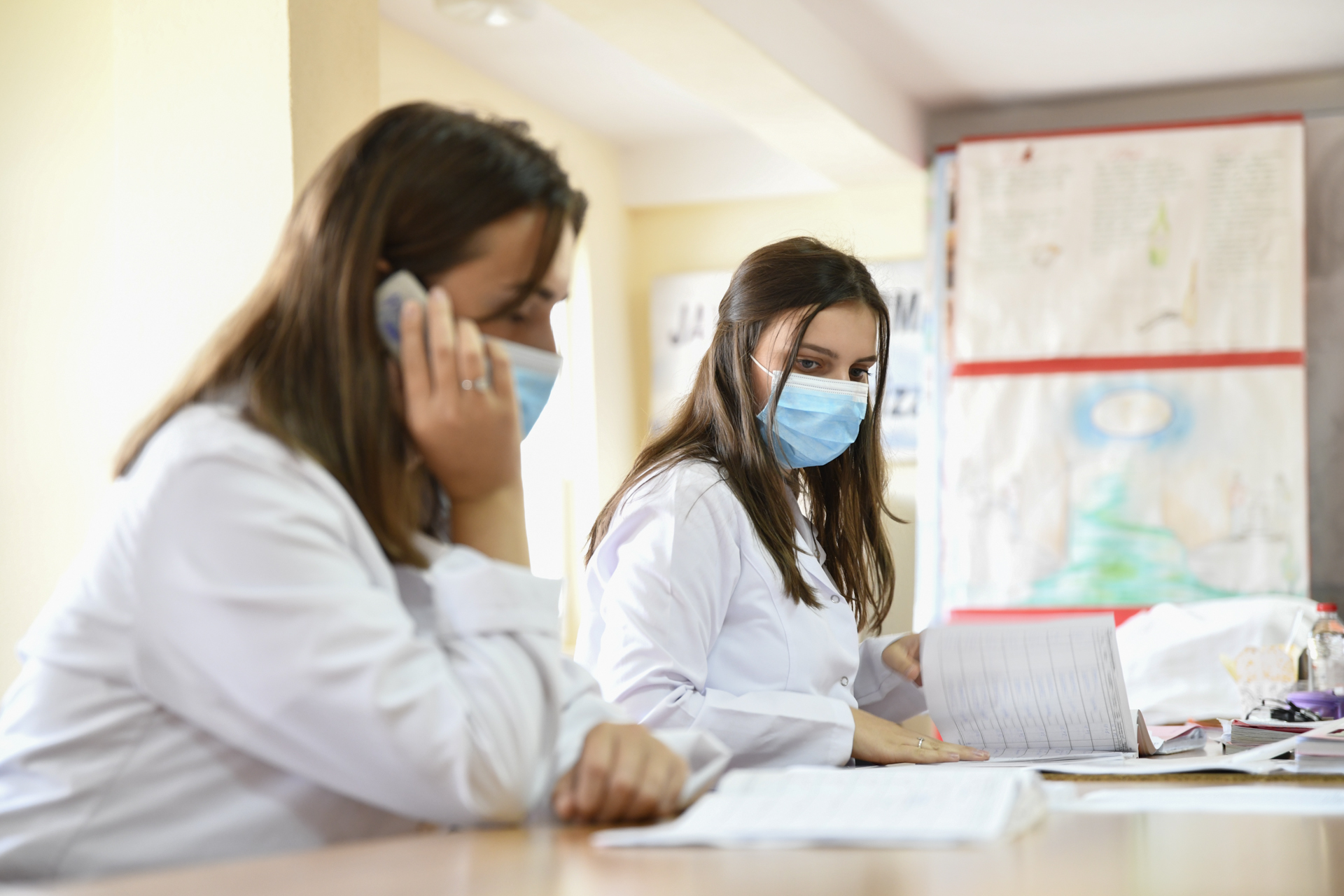
Nurses Elisona Tahiri and Hanife Ramadani help monitor the condition of those affected by COVID-19. Photo: Atdhe Mulla / K2.0
“For us, the most important thing is to inform patients about the work of the mobile team, in case they need home visits. We call each patient three times during the period of infection, but now there are patients who contact us themselves when they need to,” she said, adding that one of the most common tips they give to patients is to drink laurel leaf tea to relieve cough symptoms.
According to her, the end of August was the period when they made the most phone calls. While earlier they also contacted people who had been in contact with positive patients, the increase in cases made it impossible.
Ganimete Bajrami, 58-year-old family doctor, is a member of Ferizaj’s mobile team that makes home visits to patients with COVID-19. They currently work in three shifts — two of eight hours and the third covered by emergency services — providing 24-hour services.
“I sent the patient we just visited to the emergency room, as he was in a serious condition,” she said as soon as she got out of the ambulance. Her team, composed of nurses Fatmire Rexhaj and Enkela Abazi, put on their protective clothing and equipment and immediately headed for the next patient’s house in Lagja e Re, just north of downtown Ferizaj.
In the room they entered, a blue oxygen cylinder was lying in one of the corners near the patient’s bed. The patient in isolation, in his 60s, had an oxygen mask on and complained to the doctor about leg swelling. As the nurses set up an infusion, the doctor measured his oxygen level and encouraged him: “Keep the will [for healing] to the maximum!”
After the visit, Bajrami said that in all health care centers in Ferizaj it is clear that the workers’ have a huge workload.
“Even at the beginning of the pandemic we did not have as many patients as now,” said Bajrami. “Within a day, the number of home visits can go up to 20, just during a shift.”
The Main Family Medicine Center in Ferizaj announced that in August it had provided about 12,000 anti-COVID-19 services, from testing and infusions to vaccinations. Among these services, 856 were home visits made by the mobile team, and 3,590 were calls from the call center, the largest number of services since the beginning of the pandemic.
The constant outbreaks have created a similar situation in most family medicine centers, hospitals and clinics in the country, highlighting the poor state of a health system that lacks not only workers, but also space.
At the end of August, news emerged about a lack of personnel at Gjilan’s Regional Hospital, while in the first week of September, Peja recorded the highest number of COVID-related hospitalizations since the beginning of the pandemic, with a total of 220 patients hospitalized, of whom 192 were on supplemental oxygen. This situation forced the hospital to improvise and turn a staff room into a COVID ward.
The Ministry of Health has already asked municipalities to identify alternative spaces, such as sports halls, that could serve as field hospitals for lighter cases. Meanwhile, in the last week of August, the University Clinical Hospital Service of Kosovo (SHSKUK) announced that it was forced to stop providing some emergency hospital services in order to serve patients with COVID-19, while health staff interrupted their holidays.
In this situation, the health system is struggling with 291 deaths related to COVID-19 and 960 people hospitalized in the first 12 days of September only. The pandemic has cast a light on the lack of meaningful health reforms to address insufficient staffing, health workers’ labor conditions or the chronic mismanagement of resources in public health institutions.
Systemic problems
As the pandemic rapidly escalated, the government responded to the new wave by implementing a series of measures in late August, restoring restrictions on movement, limiting work in the restaurant industry and postponing the start of the school year.
The government increased the number of inspectors at the Food and Veterinary Agency from 11 to 96 to ensure that restaurants respected the restricted working hours. More than 1,500 additional health workers have also been temporarily employed to ease the current workload.
On August 20 the Ministry of Health announced a hiring call for 1,116 general practitioners, nurses and technicians. Thenon August 29 Minister of Health Arben Vitia announced that another 420 workers would be employed.
“This number of doctors and nurses will work for the municipalities to hold the line, offering treatment at the local level so that some patients do not need to go to QKUK [University Clinical Center of Kosovo],” said Vitia.
Data from the Kosovo Agency of Statistics shows that there were over 3,600 doctors employed in the public health sector in 2019. According to Pleurat Sejdiu, president of the Chamber of Physicians — an independent medical professional organization — close to 2,000 of them are at the forefront when dealing with the pandemic, mainly family doctors, anesthesiologists, pulmonologists, and infectious disease specialists.
However, it is unclear whether these government measures will be able to address the most systemic problems in the health system, which have accumulated over the years.
"In the last two weeks of August, a nurse took care of 25 to 30 patients, making it impossible to provide quality services,"
Naser Rrustemi, President of the Chamber of Nurses
For the Kosovo Chamber of Nurses — an independent professional organization of nurses — the government’s decision, although welcome, comes late.
The president of the chamber, Naser Rrustemi, said that they have been making monthly requests to increase the number of nurses for a long time, but these requests have not been addressed either by the management of SHSKUK or the Ministry. In particular, they made another request in June, after the termination of a number of temporary contracts of nursing staff. These contracts had been signed in October 2020, involving about 375 health workers as part of a World Bank project to help manage the pandemic.
“In the last two weeks of August, a nurse took care of 25 to 30 patients, making it impossible to provide quality services,” said Rrustemi. “The decision of the Ministry [to hire additional staff], was ad-hoc and does not solve the problem, we lack nurses.”
Rrustemi added that although additional nursing staff should be regularly hired, neither the SHSKUK nor other institutions have announced a vacancy to fill the positions of those who retired in the last few years.
According to the president of the Chamber of Physicians, Sejdiu, the lack of doctors is particularly pronounced in certain areas that are essential for the treatment of patients with COVID-19, including anesthesiologists, pulmonologists and infectious disease specialists. This hinders the organization of proper health teams, especially in COVID wards.
“A few days ago our ophthalmological colleagues [specialists for the treatment of eye diseases] sent a letter to the board of the SHSKUK stating that they cannot take professional responsibility in case of any errors [for the treatment of COVID-19] because they are not trained,” said Sejdiu. “No one has trained them.”
According to Sejdiu, the lack of specialist doctors in certain fields is largely the result of last year’s policies. When providing specializations for young doctors, the Ministry did not respect the general professional planning and human resource development strategy developed by the National Institute of Public Health of Kosovo (IKSHPK).
“The biggest shortage [of specialist doctors] is in the fields of surgery, anesthesiology and in areas that are not seen as attractive to the private sector, such as infectious diseases and public health,” said Sejdiu.
According to him, this problem could be fixed simply by reducing the number of specializations in some areas where there is no shortage of health professionals and increasing it in those areas with a deficit. However, Sejdiu said this was not done last year.
“For example, over 80 specializations have been given for dermatology because it is required by the private sector, while very few went to infectology,” he added.
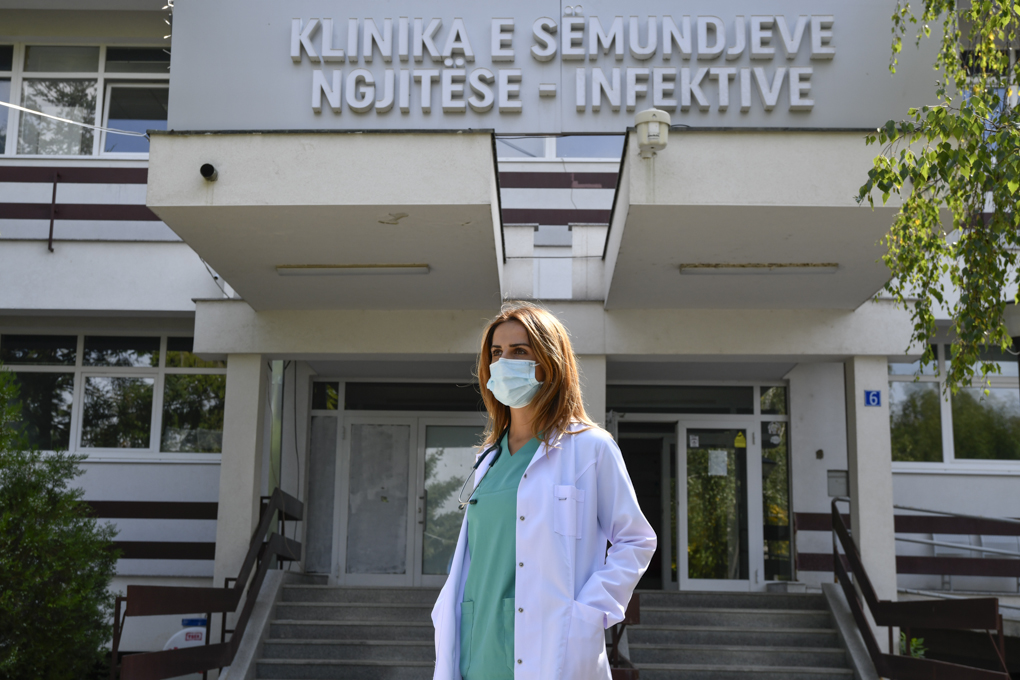
Besa Zogu, now a specialist in infectious diseases, was part of a group of young volunteer doctors who started working at QKUK in March 2020 to help the overcrowded health system. Photo: Atdhe Mulla / K2.0
One of the 18 specialists in the management of infectious diseases is Besa Zogu, 26, who has served in the Infectious Diseases Clinic at QKUK since April 2020.
She was initially hired as a volunteer doctor when the Ministry of Health, in cooperation with the IKSHPK and the Faculty of Medicine, formed a group of young volunteer doctors who assisted at various centers during the first months of the pandemic.
Zogu was then engaged in the World Bank project to help manage the pandemic as a general practitioner, and from February of this year, has continued her specialization. Her first professional experience, working during the pandemic, has been central to her choice of specialization.
“During this time, I have seen the importance of the management for infectious diseases, since the need for specialists has been very great during the pandemic,” she said, adding that currently, at the peak of the pandemic, she and her colleagues are treating over 100 patients that are under 24-hour care in the reception ward.
Public health institutions in Kosovo have been facing a shortage of professionals for years. Last year the institutions announced a competition for young specialists for the first time since 2016.
With poor job prospects, low wages and difficult working conditions, many young doctors, Besa’s peers, choose to continue their education or work in Western European countries, mostly in Germany.
"Last year, during the pandemic, three anesthesiologists left the QKUK. That created an immediate crisis. With only three doctors, what if others run away too? The whole system would be blocked."
Pleurat Sejdiu, President of the Chamber of Physicians
The average age of doctors employed in the public sector is over 50, and it is estimated that 110 doctors have left the country every year in the last three years. Among nurses, this number ranges from 300 to 350.
According to the Chamber of Physicians, the trend of doctors leaving during the first months of 2021 shows that by the end of the year the number of those leaving may reach 150. Sejdiu said that this number is worrying given the fact that this is the number of doctors that graduate every year from the Faculty of Medicine.
“We are left with zero balance. And, when you consider that the average age of the doctors who leave is 30 years old, it seems that we are losing the whole new generation,” said Sejdiu, adding that the situation becomes more alarming when there are new specialists who leave. “Last year, during the pandemic, three anesthesiologists left the QKUK. That created an immediate crisis. With only three doctors, what if others run away too? The whole system would be blocked.”
While the health system faces a shortage of doctors, Sejdiu points out that about 400 of them are currently unemployed. According to him, the main reasons for this situation are negligence by the former Ministry of Finance toward the requests of health institutions, the political lack of coordination between the central and local levels of government and an oversized administrative staff.
According to Sejdiu, improving working conditions and the quality of education, addressing the mismanagement of human resources and increasing salaries in the public sector are the only steps that would stop the departure of health professionals from the country.
Revolt in the making
The issues of wages and working conditions have been raised by health workers over the years. Those concerns were reactivated by the government’s decision on August 25 to provide a 10% increase in gross salary for public health workers by October.
For the vast majority of the health personnel this means a net increase of 60 euros in their monthly salaries. Currently, these range from about 400 euros for nurses, to 566 euros for general practitioners, and up to 661 for specialist doctors.
Since March 2020, health workers on the frontline against COVID-19 have received bonuses ranging from 150 to 300 euros during various periods of the pandemic. Therefore, the latest government decision for the additional 60 euros provoked substantial opposition.
"From now on we start with protests and continue with the strike, but we will wait until the reduction of cases of infections in the country."
Përparim Berisha, president of the Nurses’ Union
On August 30 the Nurses’ Union and, among others, the associations of nurses of psychiatry and neurology, gathered in the yard of the QKUK to announce protests during September.
“From now on we start with protests and continue with the strike, but we will wait until the reduction of cases of infections in the country,” said nurse Përparim Berisha, president of the union, during the press conference.
According to the Chamber of Nurses, which supports the protest, the dissatisfaction of the nursing staff goes beyond the 60-euro bonus offered by the government.
The president of the Chamber, Rrustemi, said that their main demands are related to the law on salaries, the drafting of the law on nursing and the improvement of the working conditions of nurses.
“Nurses, midwives and other health workers were not categorized at all in the previous version of the salary law. We are just looking to be equal with others,” said Rrustemi.
The Law on Salaries in the Public Sector was approved by the Assembly of Kosovo in February 2019 and aimed at harmonizing all salaries in the public sector. But in December of that year, the ombudsman sent the proposed law to the Constitutional Court to assess its compliance with the Constitution.
In June 2020, the Court declared the law invalid finding that it contained a number of serious problems at the constitutional level. Among other inconsistencies, it stated that despite the purpose of the law being the harmonization of salaries through the entire public sector, it made arbitrary and unreasonable exceptions for some institutions.
The revision and approval of a new law on salaries is the main request of the Chamber of Physicians, although it has not supported the calls for protest by the trade union. According to Sejdiu, this period, when there is a drastic increase in the number of patients, is not a time for doctors to protest.
“Yes, the extra from the government is denigrating and discouraging, but we have to fight for and put pressure on the wage law, so that it is approved before the end of the year and enters into force next year,” said Sejdiu. “The salary saga should end once and for all,” he said, adding that the law needs to make a more detailed categorization of doctors, depending on their specialty, risk and workload.
The original, repealed version of the law on salaries foresaw that nurses would be paid over 500 euros, general practitioners and those in specialization training over 800 euros, while specialist doctors 1195 euros.
The Federation of Health Trade Unions had given the government until September 13 to address their demands.
The basic salary, according to this law, rewarded the work according to the complexity of the function, position or rank and the level of qualification required for it. Meanwhile, the complexity was a combination of responsibility, importance, freedom of decision-making, difficulty and risk of performing tasks in that function, position or rank, as well as the limitations that accompany work.
Meanwhile, the Federation of Health Trade Unions of Kosovo (FSShK) has submitted six requests to the government, which include reviewing the decision on salary supplements and giving them retroactively in the amount of not less than 300 euros, as well as the approval of the law on salaries within 2021.
If these demands were not addressed by the government before September 13, the FSShK said that, although they will not organize a mass strike for the time being, protest will become inevitable.
According to the World Health Organization, the pandemic is considered “out of control” in a given area if the positive test rate is above five percent. Given that definition, the pandemic in Kosovo is out of control. With health workers calling for protests, authorities may have no other choice than to take their demands seriously. Applause is no longer a sufficient sign of gratitude.
Feature image: Atdhe Mulla / K2.0


